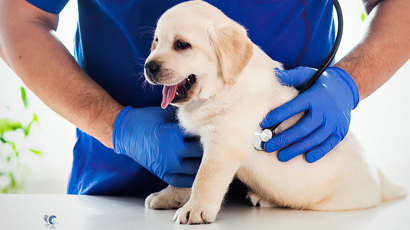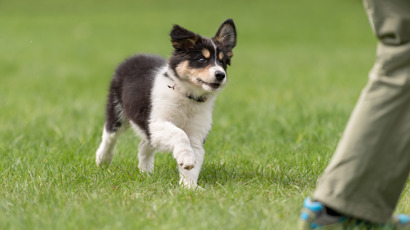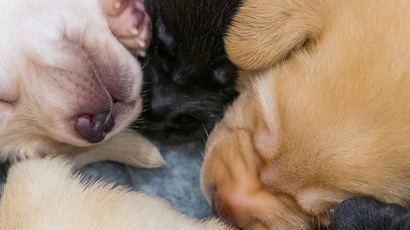Switching from puppy to adult dog food
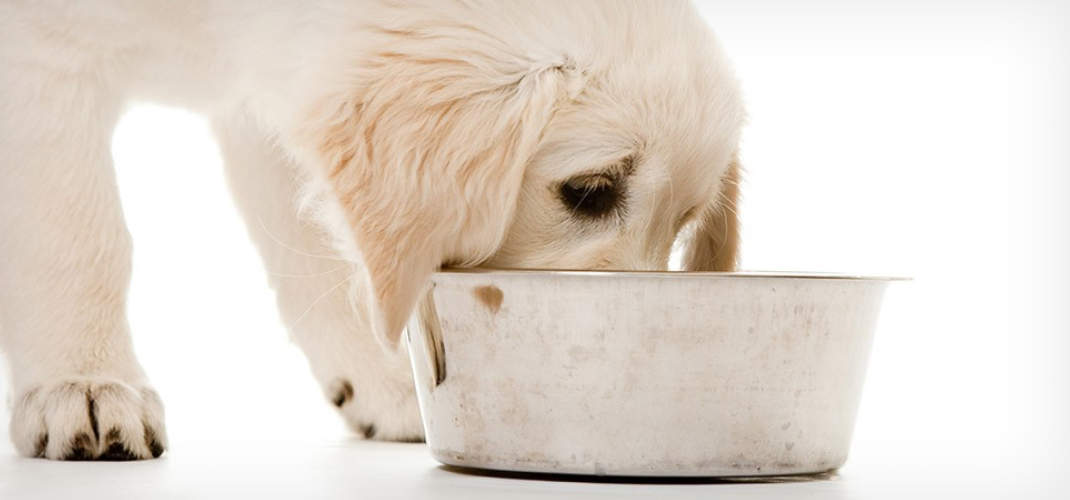
Puppies grow incredibly quickly, and before you know it, your pup will be ready to move on to an adult diet. It might sound as simple as switching over to adult dog food, but if you want to avoid digestive upsets for your puppy, it’s important to introduce their new diet gradually.
To make the transition easier on your pup, we’ve put together some helpful tips on how to transition dog food. Read on.
What’s the difference between puppy food and adult dog food?
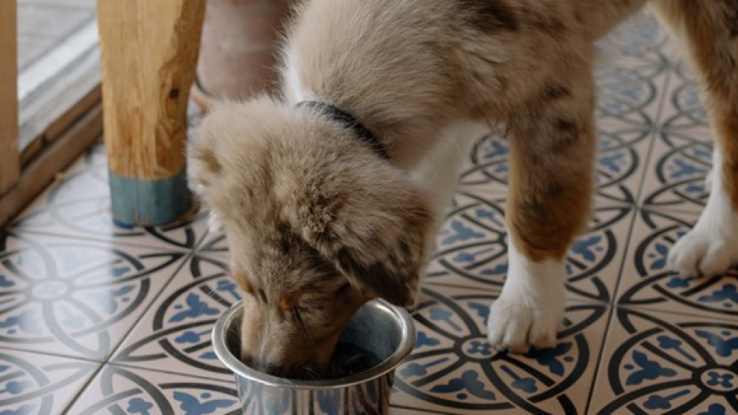
You might have noticed that puppies have a lot of energy. With this in mind, they need a much more energy-dense diet than adult dogs to support their rapidly growing bones, joints and muscles. Adult dogs, like puppies, need a complete and balanced diet but with more moderate levels of protein and calories to maintain a healthy weight, keep their energy levels high, and preserve their health.
Puppy food also contains higher amounts of proteins built from amino acids to help them develop a strong immune system, healthy skin and coat, and strong bones and muscles. In adult dogs, too much protein and fat can cause obesity with high cholesterol, joint issues and heart problems, which is why it’s important to base your dog’s diet on their age and size.
When to switch from puppy to adult food
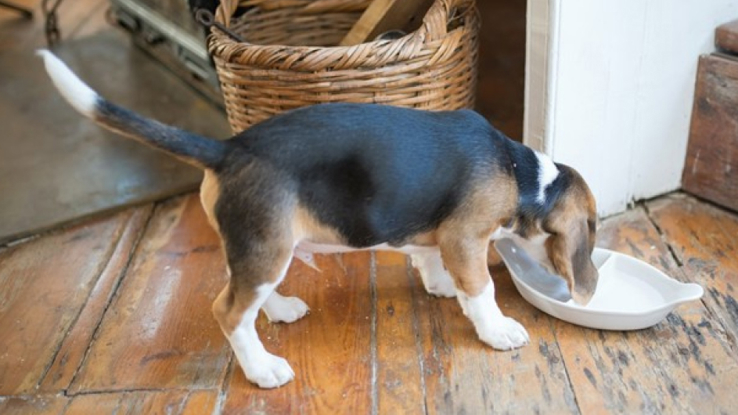
Wondering when to switch from puppy to adult food? Unfortunately, there’s no one-size-fits-all answer to this question. Puppies tend to grow until around 12 -18 months of age, but this varies by breed, body type and expected adult weight.
For small breed dogs with up to 15kg of expected adult weight, transitioning to an adult diet should start as early as 8-10 months, while medium breeds with an expected adult weight of 15kg to 30kg should transition to adult dog food between 12-15 months of age. Since large breed dogs have particularly long growth periods, they can go as long as 18-22 months before transitioning to adult dog food.
As always, if you have specific questions or concerns, it is always best to check with your vet during your regular visits. In the meantime, let’s move on to how to transition a puppy to new food.
How to transition to dog food
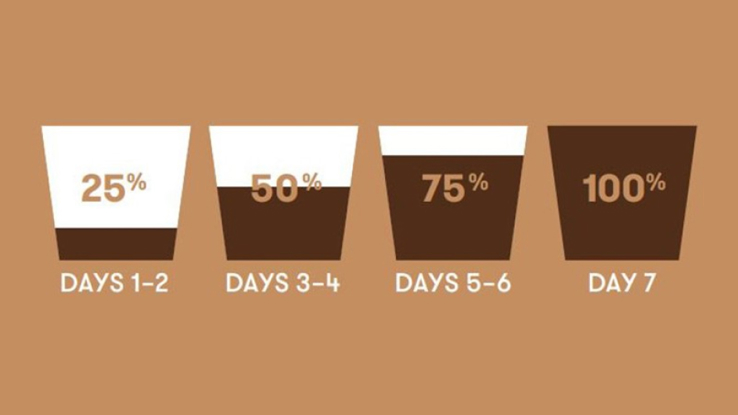
Black Hawk takes the same approach to the formulation of all of our recipes, including our puppy food and all sorts of snacks, including chicken treats, and adult dog food. This means that the raw materials are very similar, and we place a high priority on digestibility.
Still, when switching your puppy to adult food, it’s important to do it slowly.
Vets usually recommend doing this over one to two weeks (two weeks is better), regardless of what diet you’re transitioning between. The natural processes and good bacteria in your precious puppy's gut need time to adapt and change to cope with digesting their new food.
Digestion can be affected by your pup’s stomach capacity, the enzymes that break down their food, its movement through the gut, and even the balance of good bacteria in their gut. The entire system can be overwhelmed if feeding guides aren’t followed and a transition period isn’t allowed.
What does this mean?
It’s very common for puppies to have softer stools during the transition period, which isn’t usually anything to worry about. This should all be resolved by the end of the transition period, at which point your puppy should be able to eat adult dog food comfortably.
We recommend seeing your veterinarian if your dog experiences continual digestive upsets, consistently seems unwell with soft stools, diarrhea, vomiting, or goes completely off their food. An ongoing stomach upset is no fun for anyone!
A note about feeding guidelines

Whether you’re feeding a puppy or an adult dog, it's important to use the feeding guidelines on the back or side of the bag. These guidelines tell you how much to feed your dog per day — simply divide the total amount by the number of times you plan to feed your puppy each day to determine the amount of food to serve for each meal.
If you have questions about feeding guidelines, Black Hawk foods or general pet care, feel free to contact our team! We’re always happy to share tips for balanced nutrition and ideal food consumption for puppies and dogs.
Alternatively, navigate to any of our product pages and click “Daily Feeding Calculator” to instantly generate your daily feeding recommendations.
FAQs on how to transition dog food
When should I switch my puppy over to wet food?
This is entirely up to you. Many dog owners give their puppies wet food before moving on to dry food, and there is canned food on the market formulated specifically for puppies. To ensure your puppy doesn’t get too spoiled, make sure to mix wet food and dry food — otherwise, they’ll want wet food all the time!
What should I do if my puppy eats adult food?
There’s no need to worry if your puppy has a little bit of his older brother's or sister’s food. A little bit of adult food won’t hurt your puppy — the main difference with adult food is that it doesn’t meet your puppy’s nutritional needs.
Is puppy food bad for adult or senior dogs?
No, but puppy food might not meet your older dog’s nutritional needs and can lead to overweight in adult dogs.
Do ingredients matter?
Yes! Your dog’s food should be packed with genuine, natural ingredients; at Black Hawk, we believe Every Ingredient Matters®. Our super premium food contains all the right levels of energy, protein, calcium, phosphorus, omega oils, vitamins and minerals — everything your puppy needs to grow into a healthy, energetic dog.
Our premium food is available in chicken and rice variations, lamb and rice variations, and ocean fish for grain-free pups.
What should I do if my puppy refuses to eat puppy food?
If you have a stubborn little pup on your hands, we recommend having a chat with your usual veterinarian. Your vet will provide additional insight into your puppy’s nutritional needs, individual metabolism, body condition and possible meal preferences.
How often should I feed my puppy?
It all comes down to breed size. For the first three months, toy-breed puppies need four to six meals per day, whereas medium-breed and large-breed puppies need three to four meals per day. You can switch to adult dog food once your puppy reaches maturity at around 8 - 24 months, depending on breed and size.

